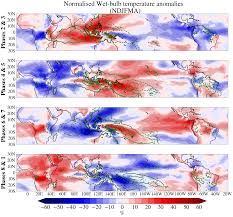Recent research published on arXiv highlights the profound influence of the Madden-Julian Oscillation (MJO) on humid heatwaves across tropical and subtropical regions. The study demonstrates that the MJO’s phases can significantly modify the likelihood and intensity of heatwaves, impacting both land and marine environments.
Understanding the Madden-Julian Oscillation
The MJO is a large-scale atmospheric phenomenon characterized by eastward-moving patterns of enhanced and suppressed rainfall. Historically recognized for its effects on tropical weather, the new study identifies that specific humidity anomalies associated with MJO phases play a critical role in triggering and amplifying humid heatwaves.
Implications for Forecasting and Risk Management
Researchers emphasize that linking MJO phases to local humidity conditions can enhance short- to medium-term forecasting of extreme heat events. Accurate predictions are essential for mitigating health risks, protecting agriculture, and preserving ecosystems in vulnerable regions.
Climate Change Considerations
The study also calls for further research into how MJO-related humid heatwaves may interact with long-term climate change trends, potentially increasing the frequency and severity of extreme weather events across tropical and subtropical zones.

